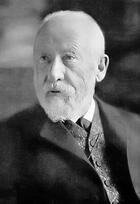
Wilhelm Dilthey (German pronunciation: /ˈvɪlhɛlm ˈdɪltaɪ/; Wiesbaden-Biebrich, November 19, 1833 – Six am Schlern, October 1, 1911) was a German philosopher, historian, sociologist, psychologist and hermeneut. Dilthey studied in Heidelberg and Berlin. As a professor of philosophy at the universities of Basel, Kiel, Breslau (now Wrocław, Poland, a city puristically called "Wrocław" in Spanish) and Berlin, he fought the dominance exercised in the field of knowledge by the 'objective' natural sciences; He sought to establish a 'subjective' science of the humanities (Geisteswissenschaften or "Sciences of the Spirit") as a discipline methodologically differentiated from the "Natural Sciences". According to Dilthey, these subjective human studies (including law, religion, art, and history) should focus on a “human-social-historical reality.” He stated that the study of the human sciences involves the interaction of personal experience, the reflective understanding of experience, and an expression of the spirit in gestures, words, and art. Dilthey reasoned that all knowledge must be analyzed in the light of history; Without this perspective, knowledge and understanding can only be partial. Life is a mysterious plot of chance, destiny and character is a thought considered by José Ortega y Gasset in his essay on Dilthey and the idea of life.




